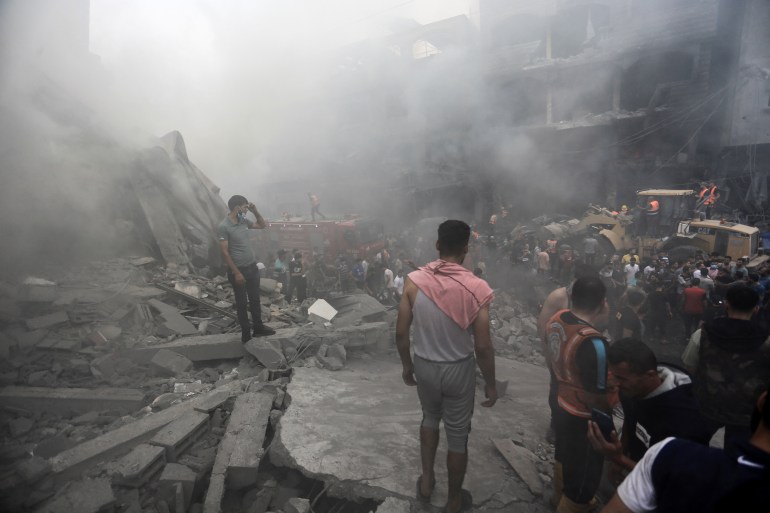Asmaa Tayeh, a writer in the camp, reflects on how the Israeli aerial bombardment has shattered her sense of safety.
Asmaa Tayeh, a young writer who lives in the camp, had grown accustomed to the sound of missiles in surrounding area since a surprise attack on Saturday prompted Israel to declare war on Hamas.
But she did not expect the place she calls home to be the target of a strike. When bombs started to fall on Jabalia, she “could hardly keep herself calm”, she told Al Jazeera, her voice trembling from the shock.
“This time was actually the closest to my house and the loudest,” she said. “For a moment I thought it was our neighbour’s house that was hit.”
The violence of the explosion shook the entire camp, sending Tayeh rushing to the window to check how close the strike was and whether her home had suffered any damage.
“I was laying on my bed and writing to an outside friend who had texted to check up on me,” Tayeh said. “All I could say to him after the crazy raids was: Thank God I’m still alive.”

However, while the immediate consequences of the strikes were not immediately obvious to her, they would soon become all too clear.
As news reports trickled in, Tayeh and her neighbours learned that the centre of Jabalia’s bustling market had borne the brunt of the attack. “The air strike hit,” Tayeh said, “and we found out that dozens of people were killed.”
In the wake of the bomb blasts, emergency vehicles raced to the market, flooding the air with the wail of sirens.
“Sounds of ambulances and cars filled the area,” Tayeh recalled. But even more piercing were the voices of “people screaming and rushing to the bombing area”.
In such a small community, where everyone knows everyone else, any loss of life can lead to collective heartbreak. But Tayeh has had little chance to mourn. The bombing pushed her to action.
“That’s when I rushed to prepare my bags to leave, in case we had to,” Tayeh explained. “Death seems to be closer, but I can do nothing about it, just like the people who were killed only minutes ago.”
Not only is the camp densely populated, but it is also home to three schools run by the United Nations Relief and Works Agency for Palestine Refugees in the Near East (UNRWA) — facilities that have been converted into shelters for hundreds of displaced families.
The tight quarters in the camp contributed to the death toll during the aerial bombardment.
Though Tayeh and her family escaped injury during the strike, any sense of security they had has been shattered. Tayeh finds herself fixated on the news, constantly checking lists of the dead and injured for the names of her friends and family.
“Luckily, we are still fine and staying in our house, but we don’t feel safe at all, just like everyone else in Gaza,” she told Al Jazeera.
That sense of danger will extend beyond the present-day conflict, she added.
“For me,” she said, “I believe we will never be safe even after the war is over. In fact, I will never feel free as long as Palestine is occupied and its people terrorised.”
Tayeh’s sentiments resonate with countless Palestinians who have endured decades of conflict and occupation.
In the shadow of the current devastation, they hold onto their resilience, their hope for a brighter future and their unwavering belief in the right to live in peace on their ancestral land.
No clear resolution is yet in sight.
